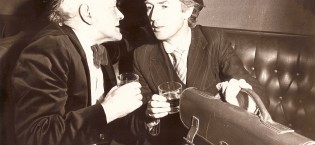Sligo Unknown Players Stage “Aftermath”
 The age-old adage that love will find a way and the unsavoury practice of matchmaking could scarcely go hand in hand. The latter is a succinct introduction to marriage and the asymmetrical harmony of life thereafter all to frequently makes for bitter tragedy. The exigency of this morbid practice was fully brought home to Sligo audiences this week when the Sligo Unknown Players presented “Aftermath”, a P. C. Murray play, in the Town Hall. But, happy to relate, this play was far removed from the ordinary run of the country kitchen drama in which stage Irishism inevitably seems to form an integral part. Although the final curtain brought tragedy, the play itself was for the most part light and humorous. Nevertheless, it was a study of characters – everyday characters – and the frivolous situations seldom cloaked the significant importance of the idea behind the play.
The age-old adage that love will find a way and the unsavoury practice of matchmaking could scarcely go hand in hand. The latter is a succinct introduction to marriage and the asymmetrical harmony of life thereafter all to frequently makes for bitter tragedy. The exigency of this morbid practice was fully brought home to Sligo audiences this week when the Sligo Unknown Players presented “Aftermath”, a P. C. Murray play, in the Town Hall. But, happy to relate, this play was far removed from the ordinary run of the country kitchen drama in which stage Irishism inevitably seems to form an integral part. Although the final curtain brought tragedy, the play itself was for the most part light and humorous. Nevertheless, it was a study of characters – everyday characters – and the frivolous situations seldom cloaked the significant importance of the idea behind the play.
Indeed, the choice of play was excellent and would probably please greater numbers than either of the presentations staged already this season by other companies. Undoubtedly it was a difficult play, especially for such a young cast, but this did not deter the players from giving an honest and pleasing interpretation of the various parts. Production was by Mr. Charlie Hughes, who once again scored a deserved success. He must be complimented, especially on the selection of such a ply, as it pleased the general audiences, and tribute must be paid to him for his perseverance in guiding young actors and actresses through difficult parts. A word of praise, too, for excellent settings. Three distinct rooms had to be prepared, and the various changes were handled with great care. The lighting and make-up were both expertly executed.
The play tells the story of a young school-teacher, Myles O’ Regan, a well-read and learned person who falls in love with Grace Sheridan, another teacher. Myles was brought up in the country, and although his mother considers that the love of the soil should be deep in his nature, the young man devotes most of his time to reading and cares little about the farm. When Myles intimates one day that he might one day marry Grace Sheridan, his mother steps in and warns him not to make such a foolish move, especially in view of the fact that a neighbour, Mrs. Hogan, had a charming niece who is fully versed in the way of the land. There would also be the added advantage that if Myles married his mother’s choice he would not have to live in a council cottage for the rest of his life. After all, he was a school-teacher, and he had his reputation and his position in life to live up to.
Although Myles fights desperately against such a match, his mother’s obdurate will wins through, and after four years of married life the home is broken and Myles goes his own way. The story of the play suggests a tragic theme, but the introduction of so many other characters – Dr. Manning, Mrs. Mc Carthy, Hannah Geary and Mrs. Dillon – give the production a light-hearted twist. The action of the play centred around Myles O’ Regan, played by Seamus Lee. For such a young actor this was a most difficult part – a part, one might say, of three complete contrasts. At first, we saw a happy Myles, the book-worm, the young man in love. Then we saw a doubting Myles, a person who was not sure of his position, a person who was his dream fading, a person who was changing his outlook on life as he struggled to withstand the constant, cruel, ugly tongue of his mother. And finally, there was the broken and dejected Myles. His home was a mere prison without bars, his career had lost much of its attraction, and even his pupils, who once looked up to him, mocked and scorned him.
Seamus Lee, in his own elegant fashion, played his part admirably. He instilled into his lines a feeling that was genuine in all its aspects. His actions were thoroughly convincing, and his distraught behaviour in the final act was expertly contrived and was strangely realistic. The impotence of Myles against his mother was always projected with a delicate sincerity. The part of Mrs. O’ Regan was filled by Gretta Dunleavy, who was ideally cast in this role. The affection her son displayed for Grace Sheridan irritated her, and she made it her business to let her son know her opinion before the affair went too far. She was, as she thought herself, out for the good of her son, and her vitriolic remarks helped her to win him to her own way of thinking. Gretta Dunleavy played her part expertly, as she seemed to get right into the character from the start. Her hard nature and stern and commanding attitude never failed to move the audience as she portrayed the qualities of a possessive mother.
The girl who seemed to be in continuous trouble, Grace Sheridan, was played by Kitsy Dowling. The strange thing about her was that although she did not want trouble, she always found herself in the middle of it. She was attacked on one side by Myles and on the other side by Mrs. O’ Regan, and she never seemed to have an answer for either of them. In the end she married Dr. Manning, and here again she seemed to be in deep water, as the match was not a good one. Kitsy Dowling, in her light-hearted way, interpreted her role with great feeling. Her depressing facial expressions, following the scolding delivered by Mrs. O’ Regan, were especially noteworthy, while her quiet and inoffensive nature in the final act was portrayed with life-like sincerity.
Vera Parke, as Mary, niece of Mrs. Hogan, was obsessed with the intention that she could always do the right thing. She was ignorant of the battle which ensued between Myles and his mother before the wedding, and she did not appear to have fully grasped the seriousness of the situation even after four years of marriage. This young actress gave a performance which was well in keeping with the general all-round standard of the acting. Her quiet and unobtrusive manner won the hearts of the audience.
Tribute must also be paid to Kay Raftery, who took two parts in the play – Mrs. Hogan and Mrs. Mc Carthy. As the latter she was completely impressive and her acting was excellent all through. The producer himself, Charlie Hughes, took the part of Dr. Manning and gave a thoroughly polished performance. Two of the smaller parts, Mrs. Dillon and Hannah Garvey – were filled by Doreen Tracey and Rita Sweeney respectively, and both made the most of their roles. As the quiet Mrs. Dillon, Doreen Tracey was always pleasing, while Rita Sweeney did her part to perfection.
Lighting – Messrs. T. Gilmartin and A. Foley; Stage Management, Messrs. T. Fallon and S. Lee; Properties, Messrs. R. O’ Neill and A. Tracey; Furniture and Properties, Messrs. Carroll and Co. and Messrs. J. Meldrum and Son Ltd., Sligo. On Monday night, Rev. G. Donnelly, C.C., St. Mary’s, Sligo, thanked the audience for their attendance and the wonderful reception. He also thanked the Unknown Players especially the producer Mr. Hughes. Proceeds are in aid of Forthill School Fuel Fund.
from The Sligo Champion, March 26th, 1960
Tags: History, Unknown Players






